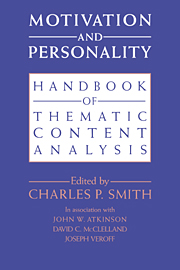Book contents
- Frontmatter
- Contents
- List of contributors
- Preface
- Acknowledgments
- 1 Introduction: inferences from verbal material
- PART I GENERAL ISSUES
- PART II CONTENT ANALYSIS SYSTEMS
- 9 The achievement motive
- 10 A scoring manual for the achievement motive
- 11 The motive to avoid success
- 12 A revised scoring manual for the motive to avoid success
- 13 The affiliation motive
- 14 A scoring manual for the affiliation motive
- 15 The intimacy motive
- 16 The intimacy motivation scoring system
- 17 Affiliative trust–mistrust
- 18 A scoring system for affiliative trust–mistrust
- 19 Power motivation
- 20 A scoring manual for the power motive
- 21 Power motivation revisited
- 22 A revised scoring system for the power motive
- 23 Personal causation and the origin concept
- 24 The origin scoring system
- 25 Explanatory style
- 26 The explanatory style scoring manual
- 27 Conceptual/integrative complexity
- 28 The conceptual/integrative complexity scoring manual
- 29 Uncertainty orientation
- 30 A manual for scoring need for uncertainty
- 31 Assessing adaptation to life changes in terms of psychological stances toward the environment
- 32 Scoring manual for psychological stances toward the environment
- 33 Self-definition and social definition: personal styles reflected in narrative style
- 34 Revised scoring manual for self-definition and social definition
- 35 Responsibility
- 36 Scoring system for responsibility
- PART III METHODOLOGY, SCORER TRAINING, DATA COLLECTION
- Appendix I Practice materials for learning the scoring systems
- Appendix II Pictures used to elicit thematic apperceptive stories
- Appendix III How to order additional practice materials
- References
- Name Index
- Subject Index
21 - Power motivation revisited
Published online by Cambridge University Press: 16 October 2009
- Frontmatter
- Contents
- List of contributors
- Preface
- Acknowledgments
- 1 Introduction: inferences from verbal material
- PART I GENERAL ISSUES
- PART II CONTENT ANALYSIS SYSTEMS
- 9 The achievement motive
- 10 A scoring manual for the achievement motive
- 11 The motive to avoid success
- 12 A revised scoring manual for the motive to avoid success
- 13 The affiliation motive
- 14 A scoring manual for the affiliation motive
- 15 The intimacy motive
- 16 The intimacy motivation scoring system
- 17 Affiliative trust–mistrust
- 18 A scoring system for affiliative trust–mistrust
- 19 Power motivation
- 20 A scoring manual for the power motive
- 21 Power motivation revisited
- 22 A revised scoring system for the power motive
- 23 Personal causation and the origin concept
- 24 The origin scoring system
- 25 Explanatory style
- 26 The explanatory style scoring manual
- 27 Conceptual/integrative complexity
- 28 The conceptual/integrative complexity scoring manual
- 29 Uncertainty orientation
- 30 A manual for scoring need for uncertainty
- 31 Assessing adaptation to life changes in terms of psychological stances toward the environment
- 32 Scoring manual for psychological stances toward the environment
- 33 Self-definition and social definition: personal styles reflected in narrative style
- 34 Revised scoring manual for self-definition and social definition
- 35 Responsibility
- 36 Scoring system for responsibility
- PART III METHODOLOGY, SCORER TRAINING, DATA COLLECTION
- Appendix I Practice materials for learning the scoring systems
- Appendix II Pictures used to elicit thematic apperceptive stories
- Appendix III How to order additional practice materials
- References
- Name Index
- Subject Index
Summary
THEORETICAL AND EMPIRICAL BACKGROUND
Definition
The power motive is the desire to have impact on other people, to affect their behavior or emotions. This broad and general definition includes a whole family of overlapping concepts such as influence, inspiration, nurturance, authority, leadership, control, dominance, coercion, and aggression. Although these concepts have varying connotations of legitimacy, morality, and implied reaction of the other person (the “target” of power), they share a core meaning of one person's capacity to affect the behavior or feelings of another person (see D. G. Winter, 1973, chapter 1).
As a class of goal striving, the power motive is to be distinguished from other power-related psychological and sociological concepts, such as roles and statuses permitting power, skill at using power, feelings of power, and values and beliefs about the exercise of power – ranging from authoritarianism to Gandhi's nonviolent satyagraha or “leverage of truth” (see Erikson, 1969, pp. 410–440). For all of its conceptual and empirical distinctiveness, the power motive does not exist in isolation. These other concepts determine how it is channeled into specific behaviors and are thereby essential to a complete understanding of the striving for power.
Conceptual framework
The idea that humans have a drive for power or “will to power” is prominent in many cultural and intellectual traditions.
- Type
- Chapter
- Information
- Motivation and PersonalityHandbook of Thematic Content Analysis, pp. 301 - 310Publisher: Cambridge University PressPrint publication year: 1992
- 34
- Cited by



